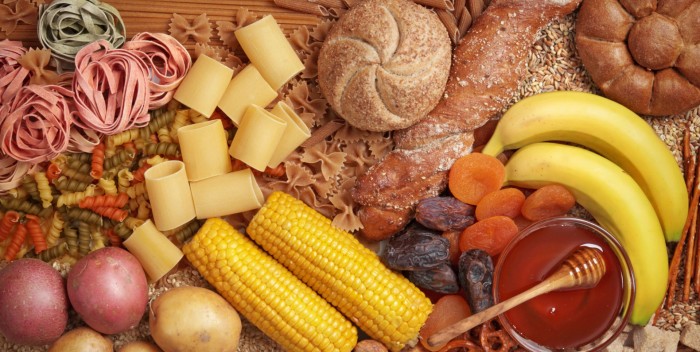Carbohydrates: benefits and harms, types, why they are needed
One of the most important sources of energy for humans is carbohydrates. Usually, they are very high in calories and their content is almost half of a person's daily calorie intake. If too much carbohydrates enter the body, then they turn into fat. How do you strike the right balance? Let's talk about this today.
Content
The benefits of carbohydrates
An important supplier of energy for humans is the so-called simple carbohydrates. These are sucrose and glucose. These types of carbohydrates are processed by the body very quickly, but they do not provide a feeling of fullness. At the same time, these types of carbohydrates are important for brain.
 But complex carbohydrates, which are digested for a very long time by our intestines, play an important role in nutrition:
But complex carbohydrates, which are digested for a very long time by our intestines, play an important role in nutrition:
- They provide normal intestinal motility.
- Remove toxic substances from the body.
- Helps eliminate bad cholesterol.
- They normalize the intestinal microflora.
Another classification of carbohydrates is complex and refined. Complex carbohydrates are part of natural foods that are good for our body.
Refined carbohydrates are found in refined foods, which are of no use to humans. They are found in baked goods, sweets, and sugary drinks. These carbohydrates are very high in calories and take many useful substances from the body for their processing. The processing of complex carbohydrates takes a long time - about 6 hours. During this period, they break down into simple ones.
Glucose, along with sucrose, provides nutrition for the brain. Glucose is required for the liver - it is involved in the formation of glycogen. Fructose is useful for diabetic patients because insulin is not involved in its breakdown.
Dairy products contain the carbohydrate lactose, which is converted into glucose and galactose. Maltose is found in molasses, honey and beer. It is the result of starch processing.
The complex carbohydrate starch is in the first place in terms of its consumption. It is converted very slowly into glucose. It is found in potatoes, pasta and bread. Another complex carbohydrate is fiber. It is practically indigestible, but it is very important for the normal process of digestion. Fiber stimulates the intestines. For the same purpose, pectins, which are found in plums and apples, are useful. They are involved in the elimination of toxins from the body.
Harm of carbohydrates
It is simple carbohydrates that are harmful to our body. They very quickly enter the bloodstream from the gastrointestinal tract and are carried through the blood to every cell in the body. It would seem that everything is very good - the human body, thanks to fast carbohydrates, gets the energy it needs almost instantly.
 But this is not the case. Fast carbohydrates also have a downside. They increase the amount of sugar in the blood very dramatically. In order to bring the state of the blood back to normal, the pancreas begins to intensively produce insulin, which is responsible for the delivery of glucose from the blood to the cells. This dramatically lowers the level of glucose in the blood, a signal about this goes to the brain and the person begins to feel severe hunger.
But this is not the case. Fast carbohydrates also have a downside. They increase the amount of sugar in the blood very dramatically. In order to bring the state of the blood back to normal, the pancreas begins to intensively produce insulin, which is responsible for the delivery of glucose from the blood to the cells. This dramatically lowers the level of glucose in the blood, a signal about this goes to the brain and the person begins to feel severe hunger.
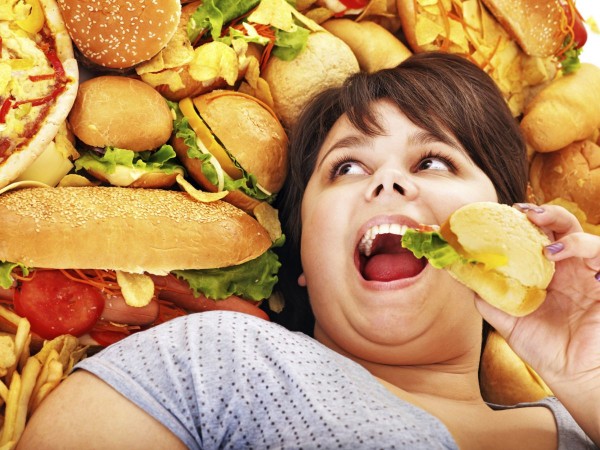 In addition, excess glucose in the body is converted into body fat. Part of this fat is deposited under the skin, another part enmeshes the internal organs, and the rest is transformed into harmful cholesterol, which settles on the walls of blood vessels and clogs them. Over time, addiction to sweets can develop, as insulin is thought to stimulate the production of the hormone serotonin, which is responsible for feelings of happiness. Therefore, many and seize stress something sweet.
In addition, excess glucose in the body is converted into body fat. Part of this fat is deposited under the skin, another part enmeshes the internal organs, and the rest is transformed into harmful cholesterol, which settles on the walls of blood vessels and clogs them. Over time, addiction to sweets can develop, as insulin is thought to stimulate the production of the hormone serotonin, which is responsible for feelings of happiness. Therefore, many and seize stress something sweet.
Types of carbohydrates
All carbohydrates can be divided into simple and complex. Simple carbohydrates have the following subspecies:
- Monosaccharides, which include glucose, fructose and galactose.
- Oligosaccharides are sucrose, lactose and maltose.
Complex carbohydrates are compounds in different combinations of glucose units. They are divided into:
- Polysaccharides, including starch (vegetable polysaccharide) and glycogen (polysaccharide of animal origin).
- Fibrous is dietary fiber, cellulose found in bran, wholemeal, cabbage, beans, and other vegetables. This group also includes lignin, which is found in cereals and vegetables. This substance enhances peristalsis and reduces the absorption of foods by the body. Fibrous also includes gums, found in oat products, and pectin. These substances reduce the absorption of fat and lower the concentration of cholesterol in the blood.
Why are carbohydrates needed
In recent years, carbohydrate-free diets are gaining increasing demand, almost completely excluding any types of carbohydrates from the daily human menu. Of course, on such a diet, weight goes away soon enough. But at the same time, the person becomes irritable, feels tired and apathetic. All this is a consequence of avoiding carbohydrates.
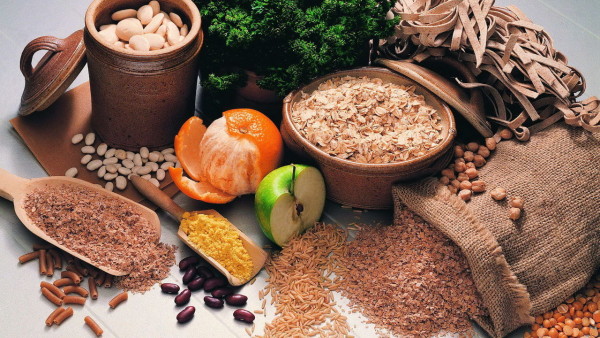 As we noted above, carbohydrates are very important for providing a person with sufficient energy. To feel refreshed, you need to include complex carbohydrates in your diet, which take a long time to be processed, give a feeling of fullness and energize for a long time. For this purpose, carbohydrates must be consumed in the first part of the day. Then they are completely processed into energy resources and are not transformed into fatty deposits.
As we noted above, carbohydrates are very important for providing a person with sufficient energy. To feel refreshed, you need to include complex carbohydrates in your diet, which take a long time to be processed, give a feeling of fullness and energize for a long time. For this purpose, carbohydrates must be consumed in the first part of the day. Then they are completely processed into energy resources and are not transformed into fatty deposits.
Carbohydrates are involved in the formation of bone and cartilage tissue, DNA synthesis and blood thinning. Carbohydrates are important for cancer prevention.
Where are carbohydrates found
All products can be divided into useful for humans and harmful in terms of their carbohydrate content. Healthy foods contain complex long-playing carbohydrates, they saturate the body for a long time and give the main supply of energy. And unhealthy foods contain mainly fast carbohydrates, which only make you feel hungry.
So, most of all simple carbohydrates are found in sweet foods: dried fruits, jam, honey, and so on. There are also a lot of simple carbohydrates in baked goods, white bread, pasta, semolina. All these products can be excluded from the menu, from which you will only gain and not lose anything.
Buckwheat contains the most complex healthy carbohydrates, oatmeal, rice, lentils, beans and peas, whole grain baked goods (usually brown). These foods should be on your table every day to provide you with enough energy.
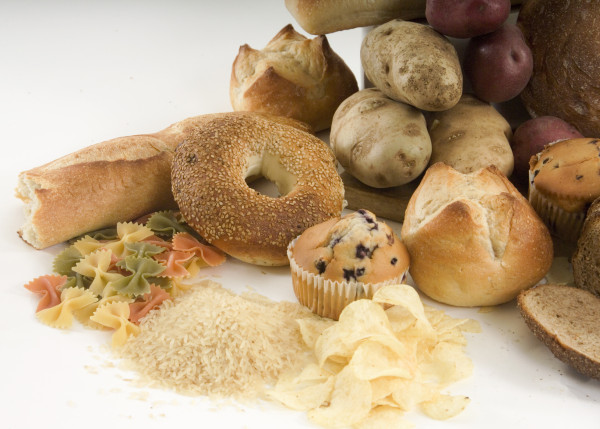 The average number of simple carbohydrates contains fruits, berries and potatoes, sugary drinks. Moreover, the sweeter the berry or fruit, the more simple carbohydrates it contains. It is better to eat potatoes boiled, and completely exclude fried and fries. It is also better to refuse sugary drinks - they do not contain any useful substances.
The average number of simple carbohydrates contains fruits, berries and potatoes, sugary drinks. Moreover, the sweeter the berry or fruit, the more simple carbohydrates it contains. It is better to eat potatoes boiled, and completely exclude fried and fries. It is also better to refuse sugary drinks - they do not contain any useful substances.
Least of all carbohydrates in dairy products and fresh vegetables. They are low in calories and good for your health. These foods contain fiber and vitamins necessary for the intestines. Especially if your diet is high in protein. In this case, fiber is very important for its processing.
How many carbohydrates do you need
The question of the amount of carbohydrates for a person worries many - both those who are on diets and counting each calorie, and those who cannot live without sweet treats.
In order for the human body to function normally, there was no tendency to obesity and changes in the hormonal background, everyone should consume no more than 100 g of simple carbohydrates. This refers to all sweet foods, including confectionery, sugar, jam and honey.
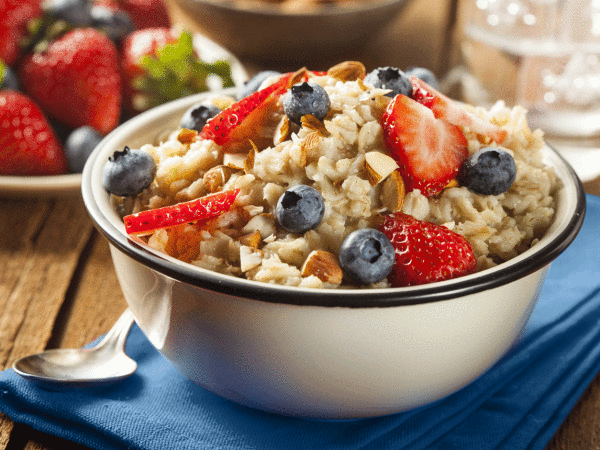 Although carbohydrates are not as high in calories as fats, they are several times higher than the latter in the amount that a person eats per day. Meanwhile, in order for the body to function normally, the amount of carbohydrates must be in a certain proportion in relation to the number of fats and proteins. So for 1 g of protein, there should be 1.2 g of fat and 4 g of carbohydrates.
Although carbohydrates are not as high in calories as fats, they are several times higher than the latter in the amount that a person eats per day. Meanwhile, in order for the body to function normally, the amount of carbohydrates must be in a certain proportion in relation to the number of fats and proteins. So for 1 g of protein, there should be 1.2 g of fat and 4 g of carbohydrates.
 In practice, it looks like this: a middle-aged 70 kg person with light physical activity should consume about 400 g of carbohydrates. At the same time, the amount of fast carbohydrates from them should be less than 100 g. With age, the amount of carbohydrates should decrease. For example, after 60 years, 333 g of carbohydrates are required, and after 75 years - only 300 g.
In practice, it looks like this: a middle-aged 70 kg person with light physical activity should consume about 400 g of carbohydrates. At the same time, the amount of fast carbohydrates from them should be less than 100 g. With age, the amount of carbohydrates should decrease. For example, after 60 years, 333 g of carbohydrates are required, and after 75 years - only 300 g.
Children need even less carbohydrates: up to 3 years old, 180 g is enough, up to 6 years old this number increases to 250 g, and up to 9 years old, 300 g of carbohydrates per day is enough.
